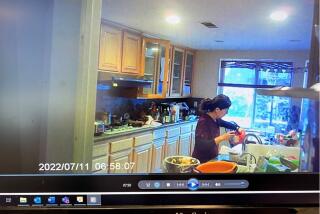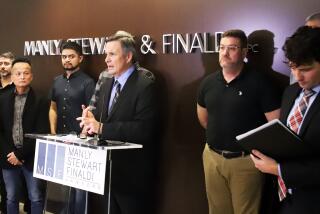NEWS ANALYSIS : Fertility Case Response Opens UCI to Criticism : Medicine: What the university knew and the timing of its reaction in its investigation against doctors raises legal and ethical questions.
As charges of medical and financial wrongdoing at the UC Irvine-based Center for Reproductive Health stack up, it is not only the clinic’s doctors who find themselves on the defensive.
The university itself, some critics say, faces disconcerting questions about its own role in the controversy and could be in for a taxing battle both in the legal arena and in the court of public opinion.
Why, for example, did it take eight months for the university to investigate charges doctors transplanted human eggs without permission before it placed the physicians on leave? Why did it take double that time to reveal that the doctors allegedly had given patients a drug not approved by the government?
Why weren’t the clinics’ financial practices monitored more closely, especially after internal audits in 1992 and 1993 revealed sloppy accounting and lax oversight? Did UCI turn a blind eye to the practices of its prized practitioners?
“They drug their feet,” said one former clinic employee, one of two whistle-blowers who complained to the university about the doctors last year. The woman, who spoke on condition of anonymity, said it was hard enough for her to report powerful and prominent doctors; the delays in investigation made the experience agonizing.
“We pursued it as rigorously as we could,” responded UCI’s Executive Vice Chancellor Sidney Golub, one of the few top university officials to answer inquiries about the burgeoning scandal since it surfaced last week.
“The investigations as they unfolded kept creating additional information. It wasn’t as if we had all our information months ago. The actions we took were taken at the time when we had sufficient information to justify them.”
Golub said the probes at UCI were hampered by lack of cooperation from the three fertility specialists, Drs. Ricardo H. Asch, Jose Balmaceda and Sergio Stone. Also, he said, the university had to be conscious of the doctors’ rights to due process under state law. The three have denied any wrongdoing.
But some critics are suspicious of the university’s contention that it was stymied by the doctors, whom UCI accused in a scathing legal complaint Thursday of tampering with and withholding records.
“You’re not supposed to roll over and play dead when a doctor says, ‘I’m not going to cooperate with you,’ ” said Michael H. Shapiro, a USC law professor specializing in bioethics. “One would expect and one would hope for quicker action.”
“I don’t think the considerations of due process are any reason for acting so slowly when the serious allegations such as these are out there,” Shapiro said.
State Medical Board Executive Director Dixon Arnett said that if administrators were having trouble getting medical records, they could have sought out his agency, which has subpoena powers.
But Arnett said that to his disappointment, UCI waited until last week to report the doctors to the board--just as the charges came out in the newspapers.
“The spirit of the law and the practical problem of record-getting should have prompted them to get in touch with us long before,” he said.
Golub said the university relied on the advice of legal counsel to determine whom to report to authorities and when to report them.
The university is under fire from an entirely different direction, as well. Some in the medical community say administrators have been too quick to blame the doctors, and ought to have quietly explored the allegations through traditional channels--such as review by fellow physicians--without making unproven suspicions public.
“It appears as if Asch may have screwed up, and what is the university’s response: ‘UCI has made no mistakes. The mistakes belong to the physicians,’ ” said one doctor on the clinical staff who spoke on condition of anonymity because of his position. “The way the university has handled this, I would think, should give other faculty members pause to consider the support the university gives its staff in good times and bad.”
All three of the doctors say they have not done anything wrong. Asch, one the nation’s foremost fertility experts, resigned from UC Irvine last week. He has denied knowingly violating the wishes of his patients, and says the university must share the blame for any administrative mistakes.
UCI’s response to the crisis, in general, has been to circle the wagons.
Many top university officials are not taking questions from reporters on their role in the growing scandal. Two key UCI officials, Chancellor Laurel L. Wilkening and medical center Executive Director Mary Piccione, have not been available for interviews all week.
Golub said university staff members are free to talk if they want to. “People have their First Amendment rights and nobody has been told they can’t talk to the press,” he said.
But more than a dozen staff members contacted recently said they were instructed not to talk to the media and referred calls to public information officer Fran Tardiff--some saying they feared they could lose their jobs if they talked.
One factor behind UCI’s reticence may be its fear of lawsuits from former patients of the center, which handles 500 to 700 appointments a year.
The fact that the university was aware of serious--and potentially harmful--allegations for a lengthy period of time and did not suspend or substantially limit the doctors’ practice troubled several legal and ethical experts.
“If something bad has happened because of their waiting, if their waiting enabled Asch and his program to do more of the same, then it is a problem,” said John Robertson, a law professor at University of Texas. “If their delay meant that some other eggs are stolen or some other patient is given unapproved drugs, then that would be an independent basis for liability.”
The university’s vulnerability to lawsuits hinges on who knew of the potential wrongdoing and when they knew it, Robertson said. In the legal action filed Thursday, university officials contended they first became aware of allegations that the doctors were hiding income from UCI and importing an unapproved drug when the first whistle-blower complained in February, 1994. They said a second whistle-blower made accusations of improper egg transplantation in September, 1994.
Robertson said the university’s legal vulnerability could increase if it is determined that administrators knew of the allegations prior to the date specified in court papers.
Much of the university’s exposure also depends on who first noticed the alleged improprieties at the center.
“If the [person who noticed] is an employee of the hospital and saw the [alleged] fabrication of the records, arguably then UCI has notice of what’s going on and has failed to take action,” Robertson said.
On the financial side, the university had early warnings of irregularities at the clinic.
Thursday’s 29-page legal complaint against the doctors makes much of a whistle-blower’s allegations that the doctors failed to report cash payments for fertility treatments.
But audits in 1992 and 1993 pointed to weaknesses in the center’s financial operations. The February, 1992, audit launched after $4,600 was stolen from a center safe over a holiday weekend found that financial record-keeping and security at the center were inadequate.
A year later, a critical second internal audit found “weaknesses in operating procedures, inadequate internal accounting controls and insufficient direct supervision over the support staff.”
Auditors noted that “there is no assurance that all billings and cash receipts are entered into the ledger.”
Some bioethics experts contend that some universities do not aggressively pursue allegations of wrongdoing because they fear losing the money and prestige prominent faculty members attract.
Several former employees of UCI said that there appeared to be special deals cut for medical stars. By the strength of their names alone, they brought business and consequently money into both their clinic and the hospital. Consequently, the bioethics experts said, they might have been allowed more leeway and less oversight than the average doctor.
“We are starting to underfund our universities,” said Arthur Caplan said, a bioethics expert at the University of Pennsylvania. “They are starting to scramble for funding, and feeling forced to tolerate activities they might not have in years past. . . . Schools these days often feel that they may have to give such autonomy to star performers if they want to be able to attract them.”
But several attorneys said universities must tread carefully whenever investigating serious allegations against any faculty members. Many universities are forced to follow labyrinthine procedures that drag out the investigative and disciplinary process, they said.
More to Read
Start your day right
Sign up for Essential California for news, features and recommendations from the L.A. Times and beyond in your inbox six days a week.
You may occasionally receive promotional content from the Los Angeles Times.






